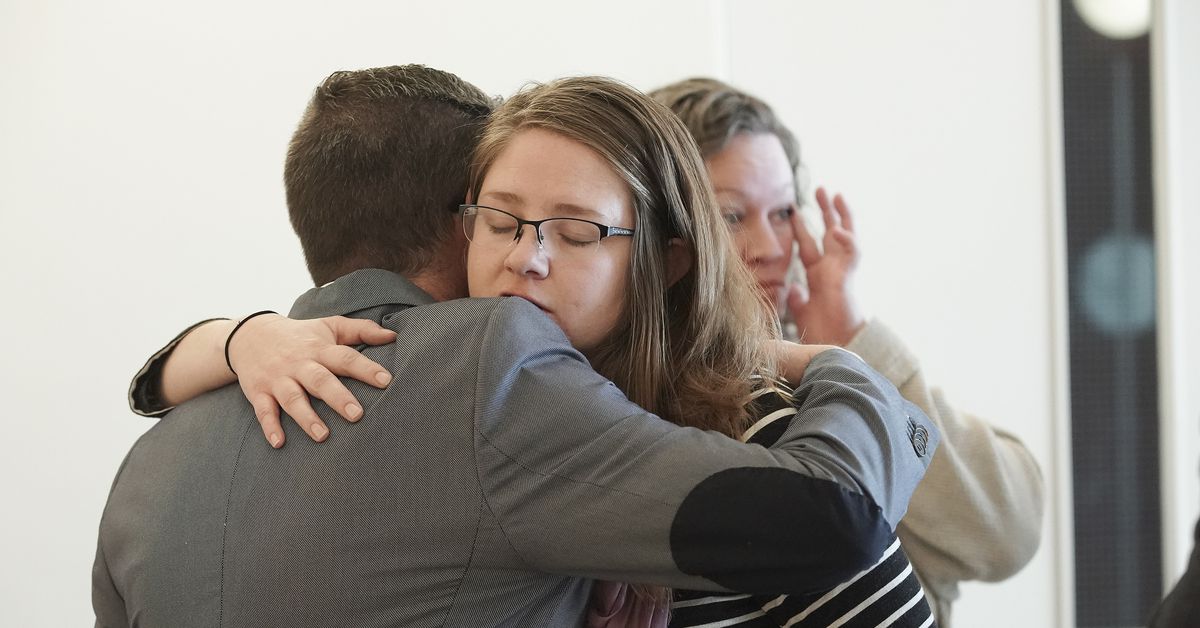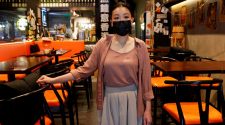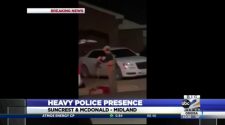SALT LAKE CITY — The night her boyfriend killed her, Rebecca Sullivan’s family says she told a friend she was planning to break up with him.
She had consulted her sisters, too. Nathan Edwin Parry antagonized those around him, often while drunk. Her family had doubts about him. She didn’t think he truly loved her.
The 41-year-old Sullivan had packed up her clothing at his place in Salt Lake City, with nice outfits folded neatly, workout wear and cash tucked inside.
“I think she may have been in the process of gathering that bag together when the violence started,” her sister, Rachel Sullivan, said. “She had been contemplating this for some time.”
Parry, 35, admitted last month to a reduced charge of manslaughter in Rebecca Sullivan’s death, a resolution prosecutors acknowledge is “remarkable” as they concede there were problems with the criminal investigation. Parry’s plea deal specifies that he will remain jailed for an additional year in exchange for his guilty plea to the second-degree felony.
In October 2018, first responders found Sullivan without a pulse in Parry’s home after he called 911. He first reported she died from aggressive sex and later said they had each tried to hang themselves, explanations found to be inconsistent with her injuries, court documents say.
A potentially deadly time
Sullivan’s death illustrates the heightened danger that experts in domestic violence say many Utahns face at the time they are ending a relationship.
There have been several high-profile cases in recent years.
• University of Utah student and track standout Lauren McCluskey broke up with her boyfriend in 2018 after she found out he lied about his age and criminal history. Less than two weeks later, he shot and killed her on campus, just one day after Sullivan’s death.
• Valerie Brantzeg, 50, filed for temporary separation from Walter Eugene Brantzeg and sole custody of their daughter roughly three weeks before he beat her to death with a crowbar in her Salt Lake City home last year.
• Belinda Thomas, 46, was plotting to distance herself from Darren Fitzgerald Byrd before he stabbed her to death in front of her 5-year-old son in West Valley City in February, prosecutors said.
• Five days after she broke off her relationship with Jeremy Patterson, Memorez Rackley, 39, and her 6-year-old son were gunned down in the middle of a quiet Sandy neighborhood in June 2017; two of her kids and a bystander survived their injuries. Patterson then took his own life.
Sullivan, known to her family and friends as “Bec,” was a French instructor who loved to sing and play guitar. She had begun training to become a certified yoga teacher and had studied teaching in Wales for about two years before returning to Utah, where she met Parry online in late 2017, her sister Anna Sullivan said.
Her family had reservations about the relationship.
Parry left beer cans strewn outside Sullivan’s apartment in Salt Lake City’s Marmalade neighborhood and picked fights with neighbors, Rachel Sullivan said, ultimately leading a landlord to ban him from the property. He once threatened to hang himself from a large black hook he had placed in Rebecca Sullivan’s kitchen, she added.
While they believed Parry manipulated her emotionally, her sisters did not suspect physical abuse — a perception they now believe was incorrect. Rachel Sullivan said she came to learn that her sister once texted a friend a picture of a bruise and had asked another, a self-defense expert, to teach her techniques, explaining that Parry liked to wrestle and she found her in situations she couldn’t get out of.
“I do think she threw little pieces out and didn’t give anyone the full picture,” Rachel Sullivan said. “She just didn’t like to burden people.”
Parry’s attorney did not return a request for comment for this story.
Power and control
Jenn Oxborrow, executive director of the Utah Domestic Violence Coalition, said the time a person leaves an abusive relationship can be among the most dangerous.
“What the research shows is that in a domestic violence situation, the more risk factors that arise in a relationship,” she said, “the greater the risk for stalking, the greater the attempt to regain power and control.”
Estrangement is one of the risk factors for women who are killed following abusive relationships, researchers at Johns Hopkins University have reported. Others include a perpetrator’s access to a gun and previous threats made with a weapon.
Oxborrow said many remain in such relationships because they feel ashamed or believe they are more likely to survive if they stay. In Utah, she said, the vast majority of those killed by intimate partners do not have a protective order at the time of their deaths.
Trained victim advocates at community organizations can help a person navigate the process, provide money and housing for those in crisis, assess their risk and connect them to legal services through a round-the-clock, confidential helpline. Yet Utah has fewer of these advocates than neighboring Western states, Oxborrow said.
“It’s getting stronger and it will continue to get stronger, but we’re behind,” she said. “There’s a perception that Utah is a really safe, healthy, wholesome community, and it is in a lot of ways. But when it comes to domestic and sexual violence, we need to do better.”
A troubled investigation
More than seven months after Rebecca Sullivan was found dead at Parry’s Salt Lake City home, he was charged with murder, a first-degree felony punishable by up to life in prison; and obstructing justice, a second-degree felony.
Prosecutors alleged Sullivan had a large V-shaped cut on her forehead and strangulation marks on her neck. They noted in charging documents that “Parry stated he lied to 911 and said he was ‘ridiculously’ drunk and terrified” and detectives determined his “multiple explanations were inconsistent with the evidence” and reconstruction of the crime.
On Dec. 20, Parry pleaded guilty to the reduced charge as Sullivan’s family members wept. His attorney, Maren Larson, reading brief facts supporting the plea, said he was “intoxicated and recklessly caused” his girlfriend’s death.
Law enforcers have acknowledged errors during the criminal investigation.
Prosecutor Joshua Graves said there were “evidentiary issues” like inaccurate measurements reported by police.
“There’s some issues with the police investigation, but I don’t want to get too far ahead of ourselves on this matter,” Blake Nakamura, chief deputy at the Salt Lake County District Attorney’s Office, told the Deseret News.
He said it would be inappropriate to share them ahead of Parry’s sentencing.
“In light of the charges, is the resolution remarkable?” Nakamura said. “Sure, it is remarkable.”
Salt Lake Police Sgt. Keith Horrocks declined to make available a detective on the case and deferred comment to prosecutors.
Sullivan’s sisters are frustrated.
“Obviously, the sentence is really disappointing. Her life was much more valuable than that,” Rachel Sullivan said. “I do feel the initial investigation was bungled.”
Third District Judge Todd Shaughnessy said in court that while he relies “pretty heavily” on attorneys’ recommendations like the one-year jail term for Parry, he wants to review the case before a Feb. 6. sentencing hearing. He said he also wants to give Sullivan’s family members a chance to be heard.
Parry’s attorneys emphasized in court documents that if he is not satisfied with his sentence, their client may withdraw his guilty plea and opt instead for a jury trial.
Rachel Sullivan, whose infant daughter Ellie died last year, said a memory of her sister performing a song she had written for the baby’s wake has stayed top of mind. In a video, Rebecca Sullivan is seen singing and playing guitar, with Parry standing behind her. She is kneeling on a patch of grass that would later become her own gravesite.
“We cannot know why you went away,” she sings. “What did we know, before we forgot how to see?”
Help for people in abusive relationships can be found by contacting the YWCA’s Women in Jeopardy program at 801-537-8600, or the confidential statewide Domestic Violence Hotline at 800-897-LINK (5465). Resources also are available online at udvc.org.



![Amazon, Best Buy, Walmart And More [Updated]](https://newsfortomorrow.com/wp-content/uploads/2019/11/1574666175_Amazon-Best-Buy-Walmart-And-More-Updated-225x125.jpg)












